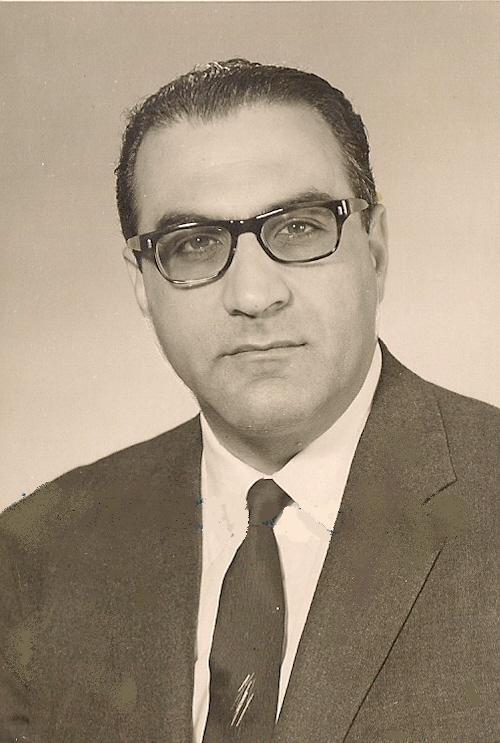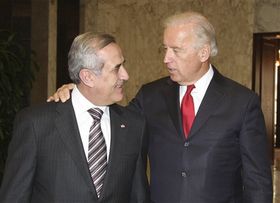Behind the News by Malek el Khazen
Sunni shift of Policy – Lebanese election no change – New Strategies in the Middle East Regions btw Israel – Arab governments and Iran
BEIRUT, Lebanon — When the Lebanese authorities announced the arrest of an Israeli spy ring late last year, the news aroused little surprise. It is no secret that Israel has long maintained intelligence agents here.
But in recent weeks, more and more suspects have been captured, including a retired general, several security officials and a deputy mayor. All told, at least 21 people have been arrested, and 3 others escaped over the border into Israel with the help of the Israeli military, Lebanese officials say.
The spying network’s extent has mesmerized the Lebanese and made headlines here. It has also infuriated Lebanese officials, who sent an official protest to the United Nations this week. On Friday, President Michel Suleiman complained about the matter in a meeting here with Vice President Joseph R. Biden Jr.
The arrests appear to reflect a newly energized and coordinated effort by the Lebanese security agencies, which now cooperate far more effectively among themselves and with Hezbollah, the Shiite militant group based here, than they did in the past.
“New technologies have helped in catching them,” said Gen. Ashraf Rifi, the director of the Internal Security Forces. “But we have also had better cooperation with the army than we had before.”
By Wendell Steavenson
Sunday, May 24, 2009
THE MEDIA RELATIONS DEPARTMENT OF HIZBOLLAH WISHES YOU A HAPPY BIRTHDAY
Unexpected Encounters in the Changing Middle East
By Neil MacFarquhar
PublicAffairs. 387 pp. $26.95
Neil MacFarquhar is that rare and wonderful thing, a Middle East correspondent who not only speaks Arabic but also grew up in the region. This experience infuses his book — the product of 20 years of reporting — with the wit, insight and eye-rolling exasperation of a near-native. MacFarquhar maintains that "the constant, bloody upheaval that captures most attention has become the barrier limiting our perspective on the Middle East" and eschews the usual descriptions of violence and gore. Instead he offers a broad cultural and personal investigation into the region. The result is an intelligent and fascinating romp full of anecdotes, acid asides and conversations with everyone from dissidents to diplomats and liberal religious sheikhs, and even a Kuwaiti woman with a sex-advice column.
Each chapter, set in a different country, illustrates a different facet of Middle East life: dictatorship, secret police, Islamic precept, the influence of Arabic satellite TV channels, reform, dissidence. Mercifully, the welter of facts and analysis which bogs down so many surveys of the contemporary Middle East is here kept brief and succinct. It’s a testament to MacFarquhar’s deep background knowledge and the lightness of his touch that complex issues like the relationship between the royal family and the religious establishment in Saudi Arabia, the Sunni-Shia divide in Bahraini politics, the myriad ways Islam can be interpreted and the rise of Hezbollah in Lebanon are distilled into clear exposition without ever being oversimplified or dumbed down.
By ARIEL DAVID
The Associated Press
Friday, May 22, 2009; 1:49 PM
VATICAN CITY — Web surfers can now send virtual postcards of Pope Benedict XVI to their Facebook friends or follow the pontiff’s travel on their iPhones.
Under a papacy that has suffered communication woes, the Vatican is taking new, technologically savvy steps to bring its message to social networking sites and smartphones.
In its first day of operation Thursday, the Pope2You portal gathered some 45,000 contacts and 500,000 page views, while a Facebook application that sends postcards with photos of Benedict and excerpts from his messages was used around 10,000 times, the head of the project said.
Also available on the portal is an application for iPhone and iPod Touch that gives surfers video and audio news on the pope’s trips and speeches, as well as on Catholic events worldwide.
The new Web site is the latest update in the Vatican’s efforts to broaden the pope’s audience and reach out to young people. In January, Benedict got his own YouTube channel, which is now linked to the portal.
Earlier this year, the Internet figured in one of Benedict’s most criticized moves _ lifting the excommunication of a renegade bishop who had denied the Holocaust.
Benedict sparked outrage by reaching out to excommunicated, ultraconservative bishop, Richard Williamson, whose denial of the Holocaust during an interview with Swedish TV shot around the world on the Net.
By Brooke Anderson, JEZZINE, Lebanon (CNS) — Sitting at an outdoor cafe on a mild spring afternoon, overlooking the town square of Jezzine, Samaan Dahir felt optimistic about Lebanon’s June 7 parliamentary elections. "The resistance needs to win," said Dahir, referring to the so-called March 8 coalition led by Hezbollah, the Shiite political party credited for liberating South Lebanon from 18 years of Israeli occupation and subsequently helping to rebuild the war-torn region. "Let’s give the opposition a chance and see the how they implement their reform programs. I’m definitely for March 8. I’m for change." Dahir, a Maronite Catholic from Jezzine, is optimistic about the election and is happy that the campaign appears to be giving more of a voice to Christians than in previous years.
The incumbent pro-Western March 14 coalition is composed by the Mustaqbal (Future) movement, made up mainly of Sunnis, but also various Christian groups (Lebanese Forces, Kataeb, Liberal Party, Quornet Chehwane, indpendants) and PSP . The opposition, is composed by Hezbollah,the Free Patriotic Movement of Maronite Catholic Michel Aoun, a retired army general, AMAL, MARADA, Tadamon and Democratic Party led by Arslan and other independants and smaller parties.
Paul Salem, director of the Carnegie Middle East Center in Beirut, compared the importance of Lebanon’s Christian voters to a swing state in a U.S. election."It’s an unintended consequence of the process," said Salem. "It doesn’t mean Ohio is the most important state or Christians in Lebanon are more important."
In memory of Cheikh Philippe El Khazen – March 6th 1996
LE CORPS MEDICAL LlBANAIS EN DEUIL
LE PROFESSEUR
PHILIPPE EL-KHAZEN N’EST PLUS

La disparition soudaine de Philippe El-Khazen, professeur honoraire a la Faculté de Médecine de l’U.S.J., chevalier de l’Ordre du Cèdre et de la Légion d’honneur, a jeté la consternation dans les milieux médicaux, politiques et sociaux de la capitale.
Cet homme foncièrement bon et qui avait le culte de l’amitié, a succombé a une attaque cardiaque implacable.
Agrégé des facultés françaises en pathologie après des études médicales a la Faculté de Médecine de Beyrouth, il devait enseigner la pathologie avant de devenir médecin-chef de I’H6pital Libanais (Geitaoui) fonde par son père Ie Dr Hanna El-Khazen, Homme de grand bien, il n’a jamais hésité a faire profiter de sa science médicale un malade indigent.
Député au Kesrouan sous le mandat du président Chamoun, il déploya une activité remarquable au profit de sa région.
Foncièrement probe, il fut toujours un homme du dialogue profondément attaché au Liban.
Vice-président de la Ligue maronite, il accepta la vice-présidence Ie l’Union Démocrate Chrétienne Libanaise, membre de l’Union Démocrate Chrétienne Mondiale. Plusieurs membres de cette union furent ses hôtes de leur visite au Liban.
On doit au professeur Philippe El-Khazen des ouvrages et des articles de science médicale.
Ghosta, sa localité natale et le Kesrouan lui ont fait d’imposantes obsèques au milieu d’une foule émue.
By SAM F. GHATTAS, Associated Press Writer Sam F. Ghattas, Associated Press Writer – BEIRUT – The Middle East’s espionage wars are heating up after Lebanon’s arrest of more than a dozen alleged Israeli spies, and dire warnings from Jerusalem that Arab groups are trying to use the Internet to infiltrate the Jewish state.
Officials in Beirut say they struck a strategic blow against Israel with the recent arrests of 15 people — 13 Lebanese and two Palestinians — who they contend were gathering intelligence on Hezbollah positions, leaders’ movements and infrastructure targets. Iranian-backed Hezbollah militants and Israeli forces fought an inconclusive war in 2006 along the Lebanese-Israeli border and both sides have since been preparing for the possibility of another.
Although Israel and its Arab neighbors have for years spied on each other, the recent announcements have highlighted the secret war of espionage and the depth of the infiltration. Lebanese officials say the spies arrested there included a math teacher and housewife, and that they were equipped with sophisticated electronics.
Lebanon holds elections June 7 but the recent arrest announcements did not seem intended to influence the vote.
FACTBOX: Facts on Lebanon’s economy
Reuters) – The economy of Lebanon, which is set to hold a parliamentary election on June 7, has shown what the International Monetary Fund (IMF) has described as "remarkable resilience" in the face of the global credit crisis.
Following are some of the economy’s main features:
GROWTH
The economy grew by more than 8 percent in 2008 according to the International Monetary Fund (IMF), despite a first half marred by the worst bout of internal fighting since the 1975-90 civil war and the onset of the global financial crisis. Policymakers are projecting growth of 4 percent or more in 2009.

BEIRUT, Lebanon, May 22 (UPI) — U.S. Vice President Joe Biden visited Beirut Friday in what U.S. officials said was a show of support for Lebanese independence prior to legislative elections. While in Lebanon, Biden was expected to announce U.S. military aid for Lebanese forces. He is scheduled to meet with President Michel Suleiman, pro-Western Prime Minister Fouad Siniora and Parliament Speaker Nabih Berri, who is aligned with the Hezbollah bloc, the British broadcaster said.
In a ceremony at Rafic Hariri International Airport in Beirut, Biden presented tons of military equipment. "Mr. minister, general, it’s a delight to be back in Lebanon, and thank you for the warm welcome," Biden said in opening his remarks. A transcript of his remarks did not identify who he was addrssing. "General, we’re going to leave some of this behind," Biden continued, "but you cannot take my plane. Air Force Two I get to keep, and the helicopters I get to keep. Other than that, the rest is going to be yours." "I’m also here to assure you … the United States of America considers itself a partner in your effort to defend your sovereignty — the sovereignty of the Lebanese state and the security of all the people of Lebanon," Biden said.



